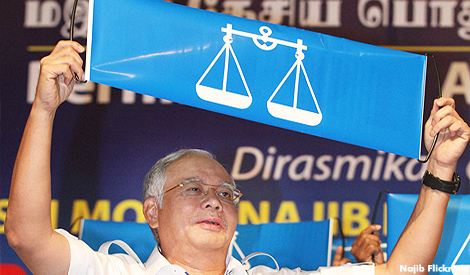COMMENT Is Internet a democratising technology? Or is it first and foremost a tool for dictators to further control their citizenry? In a recently published article, I used extensive quantitative research to demonstrate that increasing Internet use has led to more protests in authoritarian regimes.
However, although increasing use of the internet has facilitated mobilisation, other research indicates that the existence of the Internet has not contributed to the democratisation of authoritarian states. How to make sense of that? Malaysia illustrates how the Internet can enable collective action without truly threatening its authoritarian system.
Ever since independence in 1957 the same ruling coalition, BN, has been in power in Malaysia. Strict control over the traditional media has always been an important pillar of its rule. However, when the Internet became available to a wider public in the late 1990s, the Malaysian government promised not to censor the Internet in order to attract foreign investment.
At the time, this was not seen as a huge political concession: there was no ‘dictators’ dilemma’. Internet was understood in purely economic and not political terms. Also very few Malaysians had access to the web: it was not perceived as a mass medium and hence not a threat.
The political ‘tsunami’ in 2008 led to a different view of the BN government regarding cyberspace. For the first time since independence, it lost its two-thirds majority in Parliament and nearly all commentators acknowledged that the Internet had been very important for the success of the opposition.
In the years before the elections, the vast majority of the Malaysians entered the cyberspace where they were exposed to information that would never see the light of day in the national newspapers, or on television and radio channels. Learning about government wrongdoings like corruption scandals or human rights abuses, Malaysians’ perceptions of the BN government gradually changed, and it was this that impacted greatly on the polls in 2008.
Even the prime minister at the time, Abdullah Ahmad Badawi, admitted that the government had lost the online battle. He said: “We didn’t think it was important. It was a serious misjudgment. We thought that the newspapers, the print media, the television were important, but young people were looking at text messages and blogs.”
Since this wake-up call, the government has been much more active in cyberspace. Online dissidents have been increasingly persecuted, with bloggers who dig into scandals around the prime minister as well as netizens ‘insulting’ the Malaysian royalty or Islam often enough ending up behind bars. In addition, state resources have been invested in cybertroopers to influence public opinion, critical online websites have been blocked or are facing distributed denial-of-service attacks, and the government is known to possess sophisticated surveillance software.
Our traditional thinking on authoritarian regimes suggests that the primary goal of all these measures in the online realm is to suppress any further collective action against the state. More than anything else, we expect dictators to fear the threat ‘from below’. Very much in line with this is the finding that the Chinese authorities’ online censorship targets first and foremost content with a collective action potential.
In the Malaysian case however, the story is different. As a matter of fact, the Malaysian government does not censor online calls for collective action, nor does it immediately persecute activists that openly call for a protest. Why not?...


